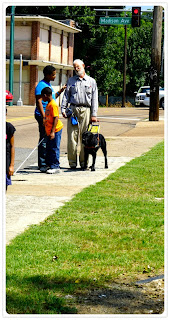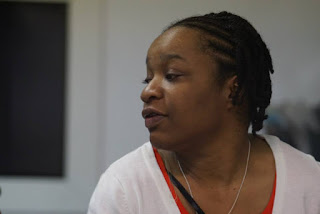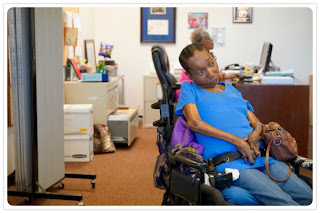By Christina Clift, MCIL Independent Living Team

As a person with a disability that prevents me from driving, legally that is, I think that it is very important to keep my transportation toolbox well stocked with a variety of tools. Of course, it contains typical tools like friends and family, public transportation, my own two feet, and cabs. However, over the last six months I’ve added two new tools to my transportation toolbox.
At first I was somewhat skeptical on how they would work, but they’ve turned out to be one of the best things I’ve ever added. Uber and Lyft are my two new transportation tools. While they are not accessible to every person with a disability, they help provide independence in getting places for me. I can only hope that they will become accessible to all.
Uber and Lyft provide transportation to individuals on demand. You don’t have to give them a three day advanced notice. You don’t have to even give them an hour notice. You just open the app that you have downloaded to your smart phone and request a ride. Unlike MATAplus, you get a real time feedback on your driver’s estimated time of arrival that is 95 percent accurate. This is done through utilizing the GPS (global positioning service) in both the rider’s and driver’s phone.
Many people might think that this type of transportation

service is not safe, but so far it has been for me. By doing background checks on the drivers, ensuring that the vehicles are in good repair, and providing the photo of the car, driver, and license plate, is a good start. The rider also rates the driver anonymously once the trip is over. Rating your driver three stars or less, you are not matched up with that driver again. The same rule applies for the drivers rating riders.
Finally, since no cash is exchanged for payment and instead is done through the app and whatever credit card you designate, ensures another layer of safety. If you’d like help in getting started with Lyft or Uber, I can send you a link for a free ride. Feel free to contact me at (901) 726-6404 or christina@mcil.org.
MCIL puts peer support and information on the road.
By Janice Craven, MCIL Independent Living Team

Since coming to MCIL full-time in February 2014, I have had the opportunity to be involved in 2 very exciting projects. Previously, I was the Assistant Director of a Pre-School for 16 years, so working at MCIL was a new and exciting challenge for me.
The Peer-To-Peer Mentoring Project is funded by TennCare as part of the federal Money Follows the Person program. The purpose of Peer-To-Peer is to Transition CHOICES Members out of Nursing Facilities and into the Community. Peer mentors, who also have a disability, work with the members pre- and post-transition to assist them in learning or brushing up on “survival skills” they will need to live in their own home.
Members are required to complete the CHOICES training and may also choose to learn more about Budgeting Your Money, Housing 101, Organizing and Prioritizing Your Life, Managing Your Supports, How To Be Your Own Best Advocate and Stress Management. In keeping with Independent Living philosophy of “nothing about us without us,” peer mentors are trained to be a trustworthy friend to walk the path to Independence alongside the Member.
Members are expected to actively participate in making decisions about how they want to live and work with the Mentor to make their dream of living independently come true!
In September 2014, MCIL ON THE ROAD began what we thought was going to be rather daunting task of doing outreach into the under-served areas of Millington and Tipton County. There are many people in these areas who have a wide range of disabilities but minimal resources available to meet their needs. There is little or no knowledge of the few supports in place and often no transportation available to use the services.
The time I have spent “on the road” has flown by and no doubt there is much work yet to be done. In the coming months, MCIL will continue to work toward helping the residents in these close-knit, often forgotten areas to acquire and develop the skills needed to live where and how they wish. MCIL ON THE ROAD has been met with great enthusiasm and support from many organizations in Millington and Tipton County. We look forward to establishing more relationships with those who share our dream of inclusion in all aspects of Community Life for people who have any type of disability.
I recently attended a meeting with others who work primarily with people who have a disability. At the conclusion, the facilitator stated that what we are doing if not a JOB but rather a CALLING. I can honestly say this is how I’ve felt from the first day I had the privilege of becoming a member of the MCIL team.

By Allison Donald, MCIL Independent Living Team

May I borrow a few minutes of your time, I have a few questions that need to be answered? How does it feel to go into the grocery store and have people stare at you? How does it feel when you are in a restaurant and the waiter asks the person that you are with what you would like to order? Or, when a complete stranger walks up to you and asks what is wrong with you? I’ll wait, for so many people with disabilities these occurrences and questions are a part of OUR daily reality. How do we begin to answer these questions in a manner that makes those who are not disabled comfortable with who we and the way we choose to live our lives?
I have NO CLUE. There is not a manual that teaches you how to navigate this beautiful struggle that is disability.
All we can do as a community is educate the parents and others letting them know that the dreams you had for that baby boy or girl can still become a reality regardless of their physical limitations. Everyone born after July 26, 1990 or generation ADA has no filter, texting is their first language, and they have access to information and resources that may not have been available to so many of us until we were well into journey with disability; they need know that advocating in their respective communities is essential and is their basic human right.
I mean, do young people with disabilities really pay attention to curb cuts or automatic doors? Or do they know what it took to gain access? People will often ignore the first thing you say to them. If you tell them that same thing four more times they may become annoyed with you. However, if you go back with that same message a ninth or tenth time you may grab their attention and they begin to realize how important it is to you. People may only start listen intently when they understand how it will affect themselves.
Is it difficult at times? Hell yes!
But if not us, who? I am of the belief that education effects attitude and your attitude heightens your level of awareness. Attitude and awareness are our weapons of choice for advocates, parents and people with disabilities as we battle isolation and dependency. “I am a reflection of the community," said Tupac. “I am not saying I am going to change the world, but I guarantee that I will spark the brain that will change the world."
I’m trying to find that spark why don’t you join me?

U of M Event lacks real understanding of access
By Bobbie Fields, MCIL Independent Living Team

The University of Memphis and provost Karen West, held their first Top 10% Recognition Ceremony in which my niece, Kierra Fields, was one of many recipients for the scholars among the Shelby County High Schools graduating classes on December 5th, 2015. Being appreciated for all their hard work, it was a proud day for many parents and guardians of graduating seniors.
The Recognition Ceremony gave the young scholars an opportunity to speak with recruiters of their interest, each college dean, of many schools within University of Memphis, was in attendance at the event. The deans provided an on-site University of Memphis college application for those interested in attending this college.
However, there was one drawback for me personally, the accessible parking wasn't actually accessible. It was more like walk to the sidewalk, walk up the sidewalk, then proceed to your destination.
The parking lot sidewalks didn’t have curb cuts so I was forced to go out to the sidewalk, go down to the driveway and walk across the busy entryway. There was a small inlet in the sidewalk next to the driveway but it had a water grate in the middle with big holes. A wheelchair tires would get stuck in them.
The seating space for wheelchairs wasn’t adequate either. Some family members had to sit in the hallway and lobby. The organizer of this event clearly didn’t understand the meaning of accessibility for a person with a disability.






